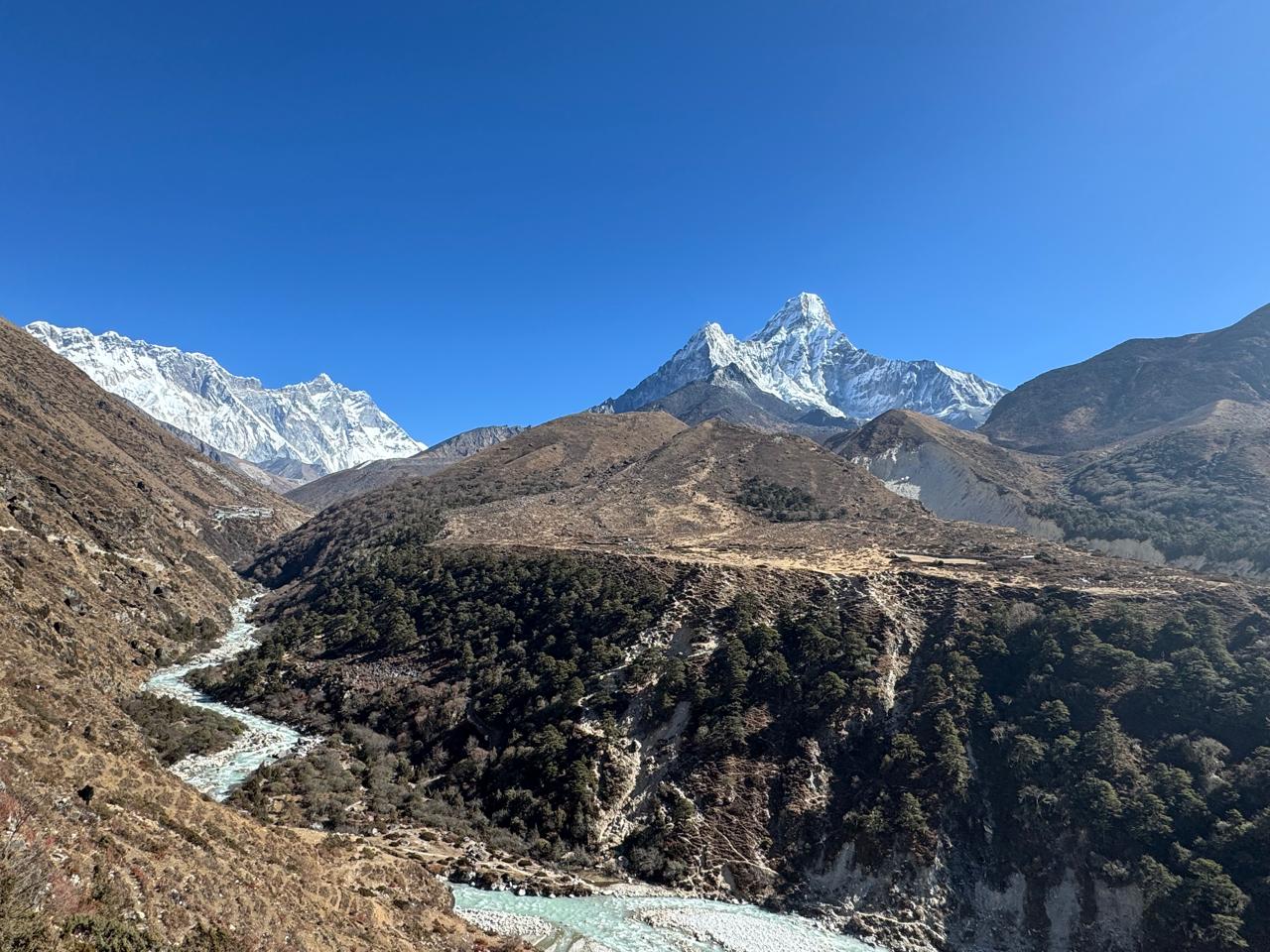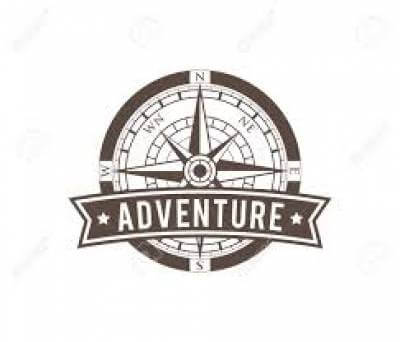14 Days Everest Base Camp Trek
Everest Base Camp Trekking offers extraordinary scenarios as towering as the alpine heights we conquer. On this legendary journey, you will hike on trails once tread by mountaineering legends, surrounded by the majestic peaks of the world’s highest mountains. The 14 Days Everest Base Camp Trek is no casual walk in the park—it demands a strenuous effort to complete, but that’s exactly where the adventure begins. Imagine standing at the foothills of the world’s tallest mountain, Mount Everest itself!
Book the Everest Base Camp Trekking package now and immerse yourself in the breathtaking Himalayan atmosphere. Breathe in the fresh mountain air and escape the monotony of daily life. Everest is calling you to break free from the routine and embrace adventure.
Daredevil Adventure of a Lifetime
Take on this once-in-a-lifetime challenge and create a momentous travel story to share proudly with friends and family. Nepal, the home of the world’s tallest mountains, is the perfect place to craft such memories. With over 14,000 snow-capped peaks, including 8 of the top 10 tallest mountains in the world, Nepal is a true mountain lover’s paradise. Among them stands the mighty Mt. Everest (8,848.86 m) — the crown jewel of the Himalayas.
Explore Everest and Discover Sherpa Culture
The Everest Base Camp Trek not only rewards trekkers with stunning Himalayan scenery but also offers intimate insights into the unique Sherpa people—renowned for their mountaineering skills and rich culture. Experience the warmth of the Sherpa lifestyle while trekking past more than a dozen snow-covered peaks. The EBC Trek tests your limits, delivering profound life lessons and the finest wilderness adventure Nepal has to offer.
Mount Everest Base Camp Trek 14 Days – A Journey to Remember
When you choose the Mount Everest Base Camp Trek, you embark on a lifetime journey full of unforgettable memories. The towering Himalayan range strikes the imagination like no other destination, drawing trekkers from all over the world. The trek is an ultimate dream for adventure seekers and nature lovers alike.
Everest Base Camp Trek Cost
The Everest Base Camp Trek Cost ranges from $1355 to $2700 per person, depending on the itinerary length, accommodation preferences, and other factors. This price ensures a professional, safe, and well-supported adventure experience in the Himalayas.
14 Days Everest Base Camp Trek – Itinerary Highlights
- Mount Everest (8,848.86 m): The highest peak on Earth.
- Scenic flight to Tenzing Hillary Airport, Lukla: A breathtaking introduction to the Himalayas.
- Everest Base Camp (5,364 m): The ultimate trekking destination, 100% recommended by adventure travelers worldwide.
- Khumbu Glacier and Icefall: Witness the world’s legendary massive glacier formations.
- Kala Patthar Viewpoint (5,545 m): Offers stunning panoramic views of the Khumbu Valley and Everest itself.
- Namche Bazaar: A bustling, high-altitude Sherpa marketplace.
- Tengboche Monastery: The spiritual heart of the Khumbu region, rich in Sherpa culture and Buddhist traditions.
- Sherpa Museum: Discover the remarkable mountaineering history of the Sherpa people.
- Hotel Everest View and Khumjung Village: Experience Himalayan hospitality and culture.
- Sagarmatha National Park: A UNESCO World Heritage Site with diverse flora and fauna at high altitudes.
- Authentic Sherpa Villages and Stunning Landscapes: Immerse yourself in Himalayan wilderness.
Spectacular Mountain Views: See Everest, Lhotse, Makalu, Ama Dablam, Nuptse, Pumori, and many more magnificent peaks.
From Sherpa Culture to Mighty Peaks: Epic Everest Base Camp Adventures
For first-time trekkers, the Everest Base Camp Trek is an ideal introduction to the Himalayas. As your trekking boots hit the trail, you’ll discover a whole new world full of adventure and unforgettable experiences.
Reaching the Everest Base Camp elevation of 5,364 m is a thrilling feat that offers views of the towering Himalayan giants in a relatively short period. The mesmerizing presence of Mt. Everest attracts trekkers globally, making it one of the most iconic adventures on Earth.
During the trek, you get a full day of rest in Namche Bazaar to absorb the rich Sherpa culture. For many mountain lovers, standing at Everest’s base camp symbolizes a prestigious achievement.
Iconic Everest Base Camp Trail – Your Two-Week Himalayan Odyssey
Your epic two-week trek begins with a nail-biting flight to Lukla, landing at the famous gateway to Everest. From the quiet village of Phakding, the journey continues to Namche Bazaar, the bustling Sherpa capital.
Along the way, enjoy engaging conversations with local Sherpa guides and villagers. The Everest Base Camp Route provides rich cultural insights alongside spectacular mountain scenery.
The trek’s climax is reaching Everest Base Camp at 5,364 m, surrounded by towering peaks. In spring, you’ll witness climbing expeditions gearing up for Everest’s summit. The trek to Kalapathar (5,545 m), the highest viewpoint on this journey, is a physical challenge rewarded by unbelievable panoramic views.
Kalapathar Viewpoint – A Majestic Sunrise Experience
One of the trek’s highlights is the early morning hike to Kalapathar to witness the sunrise illuminating Everest’s peak. This moment, etched forever in your memory, is a profound reward after days of hard trekking.
Interacting with climbers at base camp and witnessing their preparations adds to the adventure’s richness. The Sherpa culture, diverse wildlife, and pristine vegetation enrich your Himalayan experience.
Mountain Wonderland – Breathtaking Peaks Along the Trail
The views from Kalapathar leave trekkers breathless: Everest, Makalu, Pumori, Cholatse, Ama Dablam, Lhotse, Nuptse, and many other towering giants form a sparkling mountain panorama.
Operated by experienced Sherpa Expedition Teams, the trek offers complete fulfillment for every adventurer.
Who Should Take the Everest Base Camp Trek?
If you are physically fit and up for a challenging (level 5) trek, this is your ideal adventure. You’ll hike to the world’s highest base camp and ascend Kalapathar (5,545 m) for unmatched views.
Staying a night at Gorak Shep (5,180 m) — the world’s highest tea house — is a unique experience not to be missed.
Physical preparation, including cardio and hill walking for 1-2 months before the trek, is strongly recommended.
Altitude Sickness Prevention on Everest Base Camp Trek
The high altitude (up to 5,545 m) requires careful physical and mental preparation. Altitude sickness risk is real, but our itinerary ensures sufficient acclimatization days.
If you have fear of heights or dizziness, consider your fitness carefully before booking. Walking times are approximate and paced according to group fitness.
Best Time to Trek Everest Base Camp
The trekking seasons of spring (March to May) and autumn (September to November) provide the most favorable weather for clear views and pleasant temperatures.
Why Choose Sherpa Expedition Teams for Your Everest Base Camp Trek?
Sherpa Expedition Teams is Nepal’s leading trekking agency, renowned for authentic experiences, expert local guides, and a high success rate. Over 60% of our trekkers are repeat clients, testifying to our dedication and hospitality.
Our itineraries are designed by Sherpas with deep local knowledge, ensuring you get safe, hassle-free, and culturally enriching adventures.
Book your Everest Base Camp Trek with us and embark on a lifetime journey without any confusion or stress!
Important Notes for Everest Region Treks
Flights from Kathmandu to Lukla may divert via Ramechhap Manthali airport during peak seasons (Mid-September to November and March to May).
Always keep a buffer day for potential flight delays due to unpredictable mountain weather.
Independent trekking is possible but not recommended due to complex logistics and safety.
Late bookings reduce options for accommodation and flights — book early to secure the best choices.
Embark on the remarkable Everest Base Camp Trek with Sherpa Expedition Teams — your gateway to the world’s tallest mountain and the unforgettable Himalayan wilderness!
ITINERARY
Day 1 : Arrival in Kathmandu transfer to hotel (1350m)
Your Himalayan experience begins with your arrival at Tribhuvan International Airport in Kathmandu. Upon landing, our airport representative will meet you and transfer you to your hotel in the vibrant tourist hub of Thamel.
You’ll have the remainder of the day to relax after your flight or explore the lively streets, temples, cafes, and markets. In the evening, we’ll host a welcome dinner and a detailed briefing session about the trek ahead.
Day 2 : Fly to Lukla and trek to Phakding (2,610m) Duration: 4-5 hours.
Start your day early with a breathtaking 30-minute flight to Lukla, one of the most thrilling airports in the world. From Lukla, your trek officially begins as you follow a scenic trail downhill to Phakding, a riverside Sherpa village surrounded by pine forests and views of the towering peaks.
This short first day helps your body begin adjusting to higher altitudes.
Day 3 : Phakding to Namche Bazaar (3,445m) Duration: 5-6 hours.
Today’s trek offers one of the most scenic days of the lower Khumbu region. You'll cross multiple suspension bridges, including the iconic Hillary Bridge, walk through lush forests, and pass beautiful villages like Monjo and Jorsalle.
After entering Sagarmatha National Park, the trail climbs steeply for a couple of hours before reaching Namche Bazaar, the cultural and commercial capital of the Khumbu region.
Day 4 : Acclimatization at Namche Bazaar (3,445m) Hike to Everest View hotel Duration: 3-4 hours.
This is a critical acclimatization day to prepare your body for higher altitudes. In the morning, you’ll hike up to the world-famous Everest View Hotel, which provides the first clear panoramic views of Mount Everest, Lhotse, Ama Dablam, and other peaks.
After the hike, return to Namche and enjoy the rest of the day visiting the Sherpa Culture Museum, shopping for souvenirs, or relaxing in one of the local bakeries or cafes.
Day 5 : Namche Bazaar to Tengboche (3,860m) Duration: 5-6 hours.
Leaving Namche, the trail offers stunning mountain views as you gradually descend to the Dudh Koshi River. After crossing a suspension bridge, begin a steady uphill climb through rhododendron forests to Tengboche, home to the region’s largest monastery, Tengboche Monastery.
If you arrive on time, you can witness the monks’ evening chanting ceremony – a truly spiritual and peaceful moment.
Day 6 : Trek to Dingboche (4,360m) Duration: 4-5 hours.
Today, the trek leads you deeper into the mountains. The trail descends through lush forests, then crosses the Imja Khola River, and climbs gradually through Pangboche and Shomare villages before reaching Dingboche.
This beautiful village is surrounded by high peaks and is the perfect place to rest, reflect, and adjust to the altitude.
Day 7 : Acclimatization at Dingboche (4,360m) Hike to chhukung Duration: 4-5 hours.
Another rest day to allow your body to adjust to the elevation. You’ll take an acclimatization hike to Chhukung, a small settlement with incredible views of Island Peak, Makalu, and Lhotse.
This hike is especially important for preparing your body for the higher altitudes ahead.
Day 8 : Trek to Lobuche (4,930m) Duration: 5-6 hours.
The landscape becomes more dramatic today as you ascend to Lobuche. You’ll pass through Thukla Pass, where stone memorials have been built to honor climbers who lost their lives on Everest.
This part of the trail feels sacred and moving. As you continue, you'll be greeted by majestic views of Pumori, Khumbutse, and Lingtren.
Day 9 : Trek to Gorakshep (5160m) & to Everest Base Camp (5360m) – return to Gorakshep. Duration: 7-8 hours.
This is the day you’ve been waiting for! After a short trek to Gorakshep, the highest teahouse village on the route, you’ll continue to the legendary Everest Base Camp. Walk alongside the Khumbu Glacier and Icefall, where Everest expeditions begin.
You’ve now officially reached the base of the world’s highest mountain. Take photos, plant a flag, or simply reflect on your incredible journey.
Day 10 : Trek to Kalapathar (5,550m) & return to Pheriche (4,280m) Duration: 7-8 hours.
Wake early for a sunrise hike to Kalapathar, offering the most iconic panoramic views of Everest, Nuptse, and the surrounding Himalayan range. This is the best viewpoint of the trek.
After soaking in the breathtaking scenery, descend to Pheriche, a peaceful village perfect for a relaxing night.
Day 11 : Trek to Namche Bazaar (3,500m) Duration: 5-6 hours.
Retrace your steps through alpine forests and familiar trails. With the hardest part of the trek behind you, enjoy the downhill journey and revisit charming villages along the way.
Day 12 : Trek back to Lukla (2,860m) Duration: 6-7 hours.
Your final trekking day brings you back to Lukla, the place where it all began. Celebrate your successful journey with your guides and porters, and enjoy your last night in the mountains.
Day 13 : Fly from Lukla to Kathmandu Duration: 30 minutes flight.
Catch an early morning flight from Lukla to Kathmandu. Once back in the city, take the day to rest, explore local heritage sites, or do some souvenir shopping.
Day 14 : Departure home from Kathmandu Airport.
After breakfast, we’ll transfer you to Tribhuvan International Airport for your flight home. You’ll leave with new friendships, unforgettable memories, and the deep satisfaction of having completed the legendary Everest Base Camp Trek.
SERVICES
Cost Included in Your Package
- Airport Transfers: Private vehicle transfers to and from Tribhuvan International Airport in Kathmandu, ensuring a smooth arrival and departure experience.
- Hotel Accommodation in Kathmandu: Enjoy two nights in a standard twin-share, 3-star hotel in Kathmandu, complete with daily breakfast to start your day right before your trek.
- Meals During the Trek: Three nutritious meals a day (Breakfast, Lunch, and Dinner), with a wide range of options to fuel you during the trek.
- Experienced Sherpa Guide: A highly experienced, government-licensed, English-speaking local guide will accompany you throughout the trek. Their package includes meals, flight, insurance, accommodations, and trekking equipment to ensure they can fully support your journey.
- Sherpa Porters: Strong, reliable Sherpa porters will assist with carrying your luggage. Each porter will be assigned to two trekkers, and they are provided with proper safety equipment, food, accommodation, and insurance.
- Trekking Gear: We provide essential gear for your trek, including a sleeping bag, down jacket, duffel bag, and walking poles (if you don’t have your own). All of this gear must be returned after the trek is completed.
- Trekking Permits: All necessary permits are included, such as the Sagarmatha National Park fees and the TIMS card (Trekking Information Management System), ensuring a hassle-free experience on the trails.
- Accommodation Along the Trek: Basic standard trekking lodges or tea houses along the trail, offering basic amenities to help you rest and rejuvenate for the next day's adventure.
- Assistant Guide: For groups of 8 or more trekkers, an assistant guide will be included to help with group management, ensuring that everyone stays together and receives the support they need.
- Round-Trip Flights: The package includes round-trip flights from Kathmandu to Lukla and back, including applicable departure taxes. These flights are crucial for reaching the starting point of your trek.
- Seasonal Fresh Fruits: Enjoy fresh, seasonal fruits served every evening after dinner, adding a healthy and refreshing touch to your trek.
- Certificate of Appreciation: Upon successful completion of the trek, you'll receive a Sherpa Teams Certificate of Appreciation, commemorating your achievement.
- Complimentary Hiking T-Shirt: Each trekker will receive a free Sherpa Teams hiking T-shirt as a token of your adventure and hard work.
- Oximeter: An oximeter will be provided to measure your oxygen levels and pulse during the trek. This is an essential tool to monitor your health and catch any signs of altitude sickness early.
- Emergency Rescue Assistance: In case of a medical emergency or complex health condition, we will assist with arranging rescue operations, which are funded by your travel insurance.
- Taxes and Official Expenses: All government taxes, local taxes, and official expenses are covered in the package, ensuring no hidden fees along the way.
Cost Excludes
- Nepal Entry Visa: The visa for Nepal is easily obtained upon arrival at Tribhuvan International Airport in Kathmandu. The visa fees are as follows:
- USD 30 for a 15-day visa
- $USD 50for a 30-day visa
- $1USD 125or a 90-day visa
- Extra Accommodation and Meals: Any extra accommodation or additional meals you choose to have before or after the trek in Kathmandu are not included in the package.
- International Airfare: The cost of your international flight to and from Nepal is not covered.
- Additional Food and Beverages: Costs for any alcoholic and non-alcoholic drinks, soup, tea, coffee, hot chocolate, cocoa, mineral water, desserts, pie, pudding, extra food, or cold and hot drinks purchased along the trek or at tea houses are not included. This also includes any extra porters that choose to hire.
- Travel Insurance: All trekkers must have travel insurance that covers emergency high-altitude rescue and evacuation. Please make sure your insurance policy includes these aspects.
- Personal Clothes and Trekking Equipment: The cost of your personal clothing (such as trekking jackets, pants, etc.) and any personal trekking equipment (such as boots, gloves, or rain gear) is not included in the package.
- Additional Costs Due to Unforeseen Events: If there are itinerary modifications or delays caused by weather conditions, illness, government policy changes, strikes, or any unforeseen physical conditions, the additional costs will be borne by the trekkers.
- Gratuities: Tips for your guides and support staff are not included in the price. While not mandatory, tipping is a traditional practice in Nepal, and it is highly appreciated for the services provided by the trekking team.
- Any Other Unmentioned Expenses: Any other expenses that are not explicitly mentioned in the "inclusive" section of your trek package are also excluded from the cost.
Important Note:
If you need to return earlier from the trek due to sickness or any other issues, the costs for your flight, hotel, mountain room, and meals are non-refundable, and you will need to cover the additional expenses for accommodation and meals in Kathmandu on your own.
EQUIPMENTS
The following information will give you some idea about what you need to bring for the trek. It is important you do not forget the essential items, as this will determine your comfort and safety on the trek. Equally important is that you do not burden yourself with unnecessary equipment on the trek.
- Sleeping Bag (Sherpa Teams will provide, but need to return after completing the trip)
- Duffel Bag (Sherpa Teams will provide, but need to return after completing the trip)
- Fleece jacket or pullover
- Waterproof windbreaker or windcheater
- Thermal underclothes
- Rain poncho
- Down jacket (Sherpa Teams will provide, but need to return after completing the trip)
- Fleece or wool trousers
- Sun hat or scarf
- Trekking pants (two pairs)
- Mittens or woolen gloves
- Hiking socks (several pairs)
- Moisture-wicking shirts, including t-shirts
- Trekking shoes or boots with spare laces
- Flip-flops or sandals for relaxing in the evenings
- Underwear (several pairs)
- Swimsuit or swimming costume
- Sunglasses
- Headlamp or flashlight/torch
- Sleeping bag (Sherpa Teams can provide this for you)
- Trekking poles (if desired)
- Hiking backpack with a capacity of at least 40 liters
- Small lock for your backpack
- Reusable water bottles (at least two liters)
- Water purification tablets or a filtration device
- Wash towel
- Basic first aid kit
Toiletries (tissues, toilet paper, moisturizer, lip balm, sunscreen, sanitary pads, hand sanitizer, nail clippers, a small mirror, toothbrush, toothpaste, glasses, contacts, etc.)
GOOD TO KNOW
Here are a few things you need to know before you start tracking to Everest Base Camp:
🗺️ Trekking Season & When to Visit
The ideal time for the trek to Everest Base Camp is March-May and September-December. The weather during these months is pleasant, with clear blue skies and moderate temperatures. Hiking trails are open, and the mountain vistas are spectacular. The best months to trek are September to April:.Avoid the monsoon season (June-August) when the trails can be muddy and visibility is often poor.
💪 Drive It Home – The Importance of the Yesterday Before
While the trek isn’t technically challenging, the high altitude makes it physically demanding. A minimal level of physical conditioning is key. All aerobic training is beneficial for the trek, such as walking, hiking, and cardio exercises. Long-distance walks with a loaded backpack will ready you for the daily rigors of the trek. The higher you get, the more energy you will need to fight altitude sickness, so acclimatization is key.
🌄 Altitude & Acclimatization
The trek to Everest Base Camp goes up to 5,364 meters (17,598 feet), and altitude sickness is a real possibility. Your guide will assist you through gradual slopes, and the trek has acclimatization days built into it, particularly in Namche Bazaar and Dingboche. These breaks are crucial to allow your body to acclimate to the lower oxygen. Hydrate frequently and don't overexert yourself to reduce the possibility of altitude sickness.
🏞️ Cultural Insights
En route to their Everest Base Camp Trek, the Khumbu region features Sherpa villages as part of the unique character of the region. This typically takes place in a stunning landscape, but perhaps one of the reasons why people do the trek is also because it's so rich in immersing oneself in Buddhist traditions. Along the way, you will pass Buddhist monasteries, prayer flags, and mani stones (stones etched with mantras). The trek offers opportunities to visit the Tengboche Monastery, one of the largest and most significant monasteries in the Khumbu.
🏨 Accommodation & Meals on the Trail
You will lodge at teahouses (local guesthouses) during the trek, providing simple but comfortable accommodation. The accommodations may be basic, but the meals are plentiful and wholesome, including local dishes such as dal bhat (lentil soup), momos (dumplings,) ), and an assortment of Western cuisine. As always, be careful about drinking untreated water—bottled water or boiled water is best.
🛠️ Packing Essentials
Be sure to pack for the diversity of weather you’ll encounter during your trek. A good set of trekking boots, warm clothes, a sleeping b, ag and a waterproof jacket are the essentials. The key to adapting to temperature changes is layering. Don’t forget sunscreen, headlamps, MP3s, and a first aid kit. We will provide you with a duffel bag, down jacket, sleeping bag, and walking poles in Sherpa Teams to make your trek really comfortable.
🚁 Emergency Rescue & Insurance
Make sure you have high-altitude rescue and evacuation insurance as well, in case of emergencies. Due to its remoteness, helicopter evacuation may be required, should any serious health concerns arise. If necessary, Sherpa Teams help arrange emergency rescues.
🌟 Tipping Etiquette
To begin with, tipping is an everyday custom in Nepalese trekking. At the end of the trek, it’s customary to thank your guides, porters, and other staff. Although not obligatory, tips are welcome for their hard work and dedication during the trip.
With these important points to remember, you'll be on track to tackle the Everest Base Camp Trek and experience one of the most striking and fulfilling trekking adventures in the world.
MAP
PHOTOS/Videos
Departures
Select a departure month
Fill out the form below and a Travel Expert will reach out to create your perfect tour.
FAQS
I have never hike before, can I make it to Everest Base Camp?
Yes, you can. No matter who you are, as long as you are reasonably fit, can walk for 5-6 hours a day and trek/hike a few uphills, Sherpa Expedition and Trekking Trekking team will support you to the fullest to transform your dream of standing at Everest Base Camp into reality.
What is the best Season for trek to Everest Base Camp?
The month of March to May in Spring and September to December in autumn seasons are considered the best for the Everest Base Camp Trek as the weather conditions become favorable during this time, providing you with good visibility and a suitable atmosphere for Everest Base Camp trekking.
Is there an age limit for Everest Base Camp trekking?
No, there is no age limit for the trek to Everest Base Camp but, you need to be in good physical shape and have a positive attitude. We also suggest you to prior to the excursion though we suggest you to please see your doctor and obtain necessary permission and advice, as well as medications for traveling in extreme altitude prior to the excursion.
What are the meals on the Everest Base Camp trekking like?
During trekking, you will be served meals in the teahouses. Typical meals are noodles, rice, pasta or potato dishes along with vegetables and egg/chicken/meat dishes. Other items mostly served as breakfasts include Tibetan, egg, pancake, bread, porridge, muesli, and toasts with peanut butter and honey.
What kind of accommodation will be provided during the Everest Base Camp trekking?
A teahouse trekking accommodation will be made for you for the Everest Base Camp trekking whereby you will be able to stay at tea house(Local lodge) and have wholesome food and net and clean comfortable bed throughout your trekking journey. This form of arrangement also allows you to carry less baggage; you can trek at your own pace and enjoy the Everest panorama on your own schedule. It is also an eco-friendly way of trekking whereby trekkers can have more contact with the local's sherpa peoples.
Are there toilet facilities at the tea houses? What opportunities will I have for shower during trekking?
Most of the teahouses on the Everest Base camp trail have squat toilet facilities but recently built lodges have western-style toilets as well. Nowadays, flush toilets are also being introduced with number of increasing foreign mountaineers each year. It is highly recommended to carry your own toilet paper and other required toiletries. Hot shower facilities are available till Gorakshep. The most common type is a bucket shower, usual buckets with tap filled with hot water and placed in a shower room. Hot shower costs from US$ 4 to 15 per use and the price increases along with the elevation. Attached bathrooms and toilets are not available unless you book for a luxury lodge during the EBC trek.
What kind of clothes do we require for the trekking and is it possible to purchase it in Kathmandu before the start of the trip?
What you want to wear depends on you but we suggest you wear warm clothes during the Everest Base Camp trekking. A down jacket, thermal longs and top, comfortable trekking trousers, t-shirts, fleece, windproof jacket, hat, scarf, and gloves might be useful. There are numerous trekking shops in the Thamel area of Kathmandu where you can get all of these items in both local and branded stores alike. Sherpa Expedition and Trekking may also accompany and assist you if required.
Do I need to bring any bags for trekking? If yes, what kind?
During the Everest Base Camp trekking, you will be on a long journey for which you will need two bags to keep your belongings. A rucksack/duffle bag and a day bag for personal items. Sherpa Expedition and Trekking will provide you with a duffle bag (which is need to refund after the trek) that you can use throughout your entire journey and even afterward. These bags are durable and hence perfect for any kind of trekking journey. While the duffle bag will be carried by the potters, you will have to carry a day bag on your own. A day bag is a small backpack that has enough room for everything you will need on a day hike such as lunch, water, extra clothing and perhaps a few personnel items like camera, battery chargers, etc.
Do I need to bring any personal equipment like sleeping bags, down jackets, Trekking poles etc?
If possible, we suggest you bring your own equipment. However, sleeping bags and down jackets will be provided to you by Sherpa Expedition and Trekking. With regards to trekking poles, if you are used to walking with it then take them with you, as you will probably find them useful especially on the way down. They are not essential though and the walk is manageable without them. It is mostly a personal preference. If you prefer to take the trekking poles with you on the trekking then you can either bring your own pole or buy it from numerous options available in Kathmandu itself.
Is it possible for me to store extra clothing that I will not need?
Yes, if you have a bag of extra clothing for when you return from the trekking, you will be able to store it safely in Kathmandu Sherpa Expedition and Trekking office. The storage facility is provided by most hotels and lodges in Kathmandu or you can also store it in our office for the duration of the trekking.
What problems can arise on high altitude?
Our itinerary has been specially tailored to prevent any kind of AMS (Acute Mountain Sickness) while moving up to higher altitudes. Normally, altitude sickness starts from 3,600 meters and above. You will be trekking at a relatively slow and gradual pace as part of the acclimatization process. Cut off caffeinated, alcoholic and smoking items. Drink at least 4 liters of water a day. Trek slow. Don't skip the acclimatization days. Better to continue with Diamox (if any symptoms show up). Drink Garlic Soup. In the higher elevation, there is less oxygen in the air and this is more so while crossing high passes. Our expert guides will advise you on how to avoid AMS and treat it when/ if required.
Do I need insurance for Everest Base Camp trekking?
Make sure to have both medical and evacuation insurance before coming to Nepal for Everest Base Camp trekking. You should be careful in choosing a policy while traveling to a Himalayan country like Nepal as some insurance companies may make special exceptions for adventure travel. If you are confused about the insurance, please inform us and we will help you. It is usually better to arrange your insurance in your country before travel.
How long do I need to walk per day during my trek to Everest Base Camp?
The trekking will be 5-7 hours a day depending upon the landscape and destination.
How long will it take to reach Everest Base Camp?
It takes 6 to 14 days to reach Base Camp depending upon the mode of transportation and packages of Sherpa Expedition and Trekking offers.
How safe is Everest Base Camp trekking?
We at Sherpa Expedition and Trekking Team always have the safety, comfort, and satisfaction of our valued customers as our foremost priority at all times, and we assure you a wonderful and unforgettable time with us in our beautiful country. Sherpa team members of Sherpa Expedition and Trekking will be carrying all the necessary gear, equipment, and first aid kits and they have extensive first aid training. If a trekker falls sick on high altitude, the leader will decide whether to continue the trek. In case of emergency, Sherpa Expedition and Trekking have a rescue helicopter to bring you back from the higher elevation. Moreover, Sherpa Expedition and Trekking also provides oximeter to monitor the oxygen level at high altitude and offers regular health check-up facilities.
What are the mode of transportation?
You can either trek on foot or by a helicopter. Sherpa Expedition and Trekking offer exciting and reasonable Helicopter trek to Everest Base Camp for 5 days and 10 days. Sherpa Expedition and Trekking can also customize your tour as per your necessity.
What if my flight to and from Lukla is cancelled or delayed?
The flights are usually regular between September and May. But due to high altitude, bad weather and unforeseen technical issues, you may experience a delay or cancellation of the flight. On the occurrence of such events, Sherpa Expedition and Trekking charter a helicopter to make sure you are on the safe schedule either for a trek or for your flight back home which would cost extra charge as an unexpected event. However, if the visibility is less than 1,500 meters, it is unable to operate helicopter facilities and Sherpa Expedition and Trekking will reschedule the flight.
What is the luggage limit for porter and flight to Lukla?
Sherpa Expedition and Trekking will provide one porter for two trekkers to carry 20 kgs of luggage (maximum 10 kg for each trekker). Please be sure your porters are not overloaded because they do not carry only your equipment but also lift your spirit to reach new heights, and your love, affection, and generosity can be the reason for them to work hard to take you to your destination. However, the weight limit on flights to the Everest region, basically to Lukla is a total of 10 kgs and you need to pay an extra amount per kg for the excess baggage. Sherpa Expedition and Trekking pays up to 5 kgs of extra baggage making your total to 15 kgs with your hand bag.
What types of liquid do I need to drink at high altitude?
Garlic soup is a must while trekking. Sherpa Expedition and Trekking recommend trekkers to drink green tea, lemon tea, hot lemon ginger tea and drink at least 2-4 liters of water a day. However, it is better to avoid alcohol and alcoholic beverages, caffeinated items, and hot-chocolates at high altitude.
I am a vegetarian. Am I supposed to get enough meal on my trek?
Sherpa Expedition and Trekking Trekking won’t recommend non-veg items because the meat in such places may not hygienic and healthy. Sherpa Expedition and Trekking also encourage to avoid dairy and cheesy items and strongly suggest not to consume them during the trek. So, our packages are suitable for both vegan and vegetarians.
Do I need to tip my porter and guide?
Your guide and porters are a big reason why you got a chance to feel something very few can have. Apart from guiding and carrying your necessities and being mindful of your safety, they want to see you happily succeeded more than anyone like family and help you successfully complete the trek safely. So, your tips reflect gratitude towards them. So, tipping is a recommended culture for porters and guide in Nepal as a gesture of thankfulness.
Can I buy the gear in Nepal and sell it afterwards?
Sherpa Expedition and Trekking will introduce dozens of shops selling knock-off gear in Kathmandu. You can also barter those gears at the knock-off places but be sure you keep the receipt safely. Moreover, you can rent the needed gears if you do not want to buy them.
Is there Wi-Fi on the trek?
Yes, most guesthouses offer Wi-Fi, for a small charge. it cost USD$5 per day.
Are there ATMs available during the Everest Base Camp trekking?
ATM services are available only in Namche Bazaar and Lukla. However, the services might not work or run out of cash. Therefore, we suggest you carry a small amount of money to buy snacks, etc during the trekking.
Will I be able to charge my batteries during trekking in the Everest Base camp?
Most of the tea houses/ lodges have electricity whereby you will be able to charge your iPod or camera batteries. Please note that lodges/tea houses will charge you some extra money for the services. The fee may vary from 1 USD to 3 USD per hour.
Latest Traveller’s Reviews
Travel experiences of our clients who recently returned from their trips.
100%
Based On 74 Reviews
Ibrahim Yusif Gezawa
United Kingdom
August 13, 2024
Skilled and Attentive
Lakpa Sherpa provided exceptional guidance during our Everest Base Camp trek. His expertise in navigating the rugged terrain and his attention to detail in planning each day’s trek were invaluable. Lakpa’s friendly and attentive nature made the experience comfortable and enjoyable. His insightful knowledge of the region’s history and culture added depth to our journey. Lakpa’s skillful and caring approach made him a standout guide.
Betty Andrew
Germany
August 3, 2024
Reliable and Insightful
Dawa Sherpa’s guidance on the Everest Base Camp trek was both reliable and insightful. His thorough knowledge of the region and his ability to navigate high-altitude challenges ensured a safe and smooth journey. Dawa’s friendly and supportive nature made the trek enjoyable, and his stories about the Himalayas added a personal touch. For a trek that combines expertise with a warm personality, Dawa is highly recommended.
Koko Lorenzo
Australia
July 26, 2024
Knowledgeable and Encouraging
Trekking with Kumar Tamang to Everest Base Camp was a wonderful experience. Kumar’s extensive knowledge of the trails and his ability to provide detailed information about local traditions were impressive. His encouraging and supportive attitude helped us through the more challenging parts of the trek. Kumar’s friendly demeanor and dedication to ensuring a positive experience made this trek both memorable and enjoyable.
People Considering This Package Right Now Check availability


























